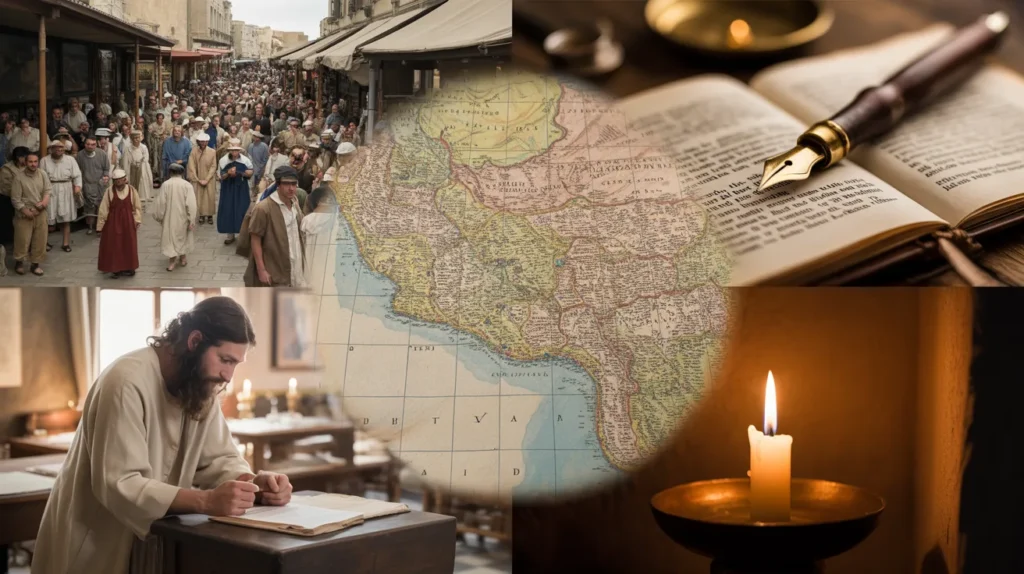Have you ever felt an unshakeable connection to a promise made or received? That deep sense of commitment is at the heart of the covenant in the Bible. A biblical covenant is far more than a contract—it’s a sacred relationship bound by God’s faithfulness and purpose. From Genesis to Revelation, the Bible is woven together by covenants that reveal God’s desire for a personal relationship with His people.
The biblical narrative is woven together by covenants, showcasing God’s relentless pursuit of a relationship with humanity. From the earliest chapters of Genesis, we see God entering into covenants with individuals, making solemn promises that underscore His faithfulness and love.
Key Takeaways
- Understanding covenants in the Bible reveals God’s desire for a personal relationship with His people.
- Covenants highlight God’s faithful character and commitment to His promises.
- The concept of covenant is central to the biblical narrative, connecting God’s redemptive plan from Genesis to Revelation.
- God’s covenant relationships demonstrate His heart to rescue and restore a broken world.
- Covenants differ significantly from modern contracts, emphasizing a relational rather than transactional nature.
- God’s covenant promises offer comfort and security to believers facing uncertainty.
God’s Heart for Relationship: The Foundation of Biblical Covenants
The idea of covenant is central to the biblical narrative, revealing God’s heart for a personal and meaningful connection with humanity. This concept is foundational to understanding the Bible’s storyline and God’s interactions with His people throughout history.

What Is a Covenant in Biblical Terms?
In biblical terms, a covenant is a chosen relationship or partnership where two parties make binding promises to each other, working together towards a common goal. The Hebrew word “berit” (covenant) signifies a binding agreement, often sealed with promises and obligations. This concept is first introduced in Genesis 1-3, where God creates humans in His image to partner with Him in spreading goodness throughout the world.
- God invites Adam and Eve to be priest kings, representing His generous rule on Earth.
- The relationship between God and humanity is established on trust and partnership.
Why God Uses Covenants to Connect With Us
God uses covenants to connect with us because they reflect His character and desire for a deep, personal relationship with His people. Through covenants, God demonstrates His patience and persistence in pursuing us despite our failures. By examining the covenants throughout Scripture, we see God’s consistent character and His willingness to meet humanity where we are.
- God’s covenants reveal His heart for humanity and His desire for a meaningful connection.
- Understanding covenants helps us grasp God’s intentions for our lives as His covenant people.
As we explore the biblical concept of covenant, we are encouraged to embrace our identity as God’s covenant people and walk daily in a covenant relationship with Him. This understanding fosters a deeper connection with God and a greater appreciation for His faithful promises.
The First Promise: God’s Covenant with Noah
God’s covenant with Noah, as recorded in Genesis, underscores His commitment to preserving creation despite human sin. After the flood, God enters into a formal covenant not just with Noah, but with all living creatures, promising never again to destroy the earth with a flood (Gen. 8:20-9:17).
The Rainbow of God’s Faithfulness (Genesis 9:12-17)
God used the rainbow as a sign of His covenant with Noah, powerfully reminding us of His faithfulness. In Genesis 9:12-17, we read about the establishment of the rainbow as a sign of the covenant, symbolizing God’s promise to never again destroy the earth with a flood. This visible reminder in the sky is a testament to God’s commitment to His creation and to the people on earth.
The significance of the rainbow lies not just in its beauty but in its role as a covenant sign. It represents God’s faithfulness and serves as a reassurance of His promises. For believers today, the rainbow can be a powerful symbol of hope and trust in God’s faithfulness.
Finding Hope in God’s Promises During Life’s Storms
The Noahic covenant offers more than just a historical account; it provides a framework for understanding God’s relationship with humanity and His creation. In the face of life’s storms, whether they be personal struggles or global challenges, the promise of the Noahic covenant reminds us of God’s control and His commitment to preserving the world and its people.
As we navigate through difficult times, we can find hope and comfort in the promises of God, just as Noah did after the flood. The covenant with Noah demonstrates God’s unwillingness to give up on humanity, despite our propensity towards sin and death. It is a testament to His grace and love for the world and all living things.
By reflecting on the Noahic covenant, believers can be encouraged to trust in God’s promises and to live with the assurance of His faithfulness, even in the midst of life’s challenges.
A Family Chosen to Bless the World: The Abrahamic Covenant
In the Abrahamic covenant, we see a beautiful illustration of God’s redemptive plan, where one family is chosen to be a blessing to all nations. This covenant, progressively developed in Genesis 12, 15, and 17, marks a significant moment in biblical history. God enters a redemptive partnership with Abraham, promising him a huge family that will inherit a specific land in Canaan and bring universal blessing to all humanity through his family.
Walking by Faith into God’s Promises (Genesis 15:5-6)
Abraham’s faith response to God’s promises, as seen in Genesis 15:5-6, provides a powerful model for our own faith journey today. When God promises Abraham that his offspring will be as numerous as the stars, Abraham believes God, and it is credited to him as righteousness. This passage highlights the importance of trusting in God’s promises, even when they seem impossible. Just as Abraham walked by faith, we are called to step out in trust, leaving our comfort zones to follow God’s leading.
In our daily lives, this means embracing the unknown, just as Abraham did when he left his country to follow God. It’s about trusting that God’s plans are greater than our own and that He is faithful to fulfill His promises.
Embracing Your Role in God’s Bigger Story
The Abrahamic covenant not only shaped the history of Israel but also reveals God’s global vision to bless all nations through one family. As spiritual descendants of Abraham through faith in Christ, we are part of this bigger story. The covenant sign of circumcision marked Abraham’s descendants as God’s chosen people, symbolizing their commitment to walk with God and be a blessing to others.
Today, we are called to embrace our role in God’s redemptive plan, living out our faith in a way that brings blessing to those around us. This involves walking blamelessly before God, training our families to do what is right and just, and being a light in our communities and the world.
As we reflect on the Abrahamic covenant, we are encouraged to trust in God’s promises and be part of His bigger story. May we walk in faith, just as Abraham did, and be a blessing to the world around us.
The Covenant in the Bible: From Law to Love
God’s covenant with Israel, mediated by Moses, is foundational to the biblical concept of covenant, emphasizing both divine grace and human responsibility. This covenant, often referred to as the Mosaic covenant, was not just a legal agreement but a relationship-defining moment between God and His people.
Understanding the Mosaic Covenant (Exodus 19:5-6)
The Mosaic covenant, as detailed in Exodus 19:5-6, signifies God’s desire to make Israel “a kingdom of priests and a holy nation.” This was not merely a call to legalistic observance but a call to a distinct identity and purpose. God’s intention was to create a people who would mediate His goodness and glory to the nations, embodying a relationship built on grace and obedience.
Exodus 19:5-6 states, “Now if you will indeed obey my voice and keep my covenant, you shall be my treasured possession among all peoples…and you shall be to me a kingdom of priests and a holy nation.” This passage highlights the conditional nature of the covenant, where obedience to God’s voice and the keeping of His covenant are paramount.
The giving of the law was not intended to be burdensome but was designed to be a loving boundary that defined the covenant relationship. As “the law was given through Moses; grace and truth came through Jesus Christ” (John 1:17), we see the law as a precursor to the grace that would be fully revealed in Jesus Christ.
Grace Within the Boundaries of God’s Law
The Mosaic covenant was preceded by God’s deliverance of Israel from Egyptian slavery, demonstrating that grace always comes before obedience. The law, summarized in the Ten Commandments, served as a guide for Israel’s life in the promised land, reflecting God’s holiness and His desire for an intimate relationship with His people.
The tabernacle, a central aspect of the Mosaic covenant, symbolized God’s desire to dwell among His people, further emphasizing the relational aspect of the covenant. The blessings and curses outlined in Deuteronomy 28 show God’s commitment to this relationship, promising blessings for obedience and curses for disobedience.
For us today, the principles of the Mosaic covenant offer a framework for understanding God’s character and our relationship with Him. It reminds us that God’s laws are not restrictive but are given to guide us into a deeper, more meaningful relationship with Him. As we reflect on the Mosaic covenant, we are encouraged to embrace the grace that underlies God’s laws and to live in the freedom that comes from a covenant relationship with Him.
The Promise of a Forever King: God’s Covenant with David
In 2 Samuel 7, we find a crucial turning point in the history of God’s people, as God establishes His covenant with David, promising an enduring kingdom. This covenant not only marked a significant moment in Israel’s history but also laid the groundwork for the coming of Jesus Christ, the ultimate fulfillment of God’s promise to David.
A Throne Established Forever (2 Samuel 7:16)
The promise that God’s throne would be established forever is a cornerstone of the Davidic covenant. In 2 Samuel 7:16, God says to David, “Your house and your kingdom shall endure forever before me; your throne shall be established forever.” This verse underscores God’s commitment to establishing an eternal kingdom through David’s lineage, a promise that transcends the failures of human kings, pointing ultimately to Jesus Christ, the Son of David.
Finding Security in God’s Unchanging Promises
The covenant with David reminds us that God’s promises are steadfast and unchanging, even when human circumstances seem uncertain. Just as God was faithful to David and his lineage, so too does He remain faithful to His people today. This assurance gives us security in our own lives, knowing that God’s promise to us, as to David, is rooted in His unwavering commitment to His name and His nation. As we face life’s challenges, we can draw comfort in the knowledge that God’s covenant promises are our anchor, holding fast in the midst of turmoil.
As we reflect on the Davidic covenant, we’re reminded that our God is a God of faithfulness, who keeps His promises across generations. This truth encourages us to trust in His sovereignty and love, walking daily in the light of His unchanging covenant with us.
Jesus and the New Covenant: The Fulfillment of God’s Promises
The fulfillment of God’s promises is embodied in Jesus, who inaugurates the new covenant, revolutionizing our understanding of divine love and commitment. This covenant is not just a continuation of previous covenants but a transformative fulfillment that redefines the relationship between God and humanity.
The Ultimate Covenant Keeper
Jesus is described in Hebrews 9:15 as “the mediator of a new covenant.” This verse underscores Jesus’ role in establishing a covenant that is based on His sacrificial death, which fulfilled and transformed all previous covenants. By shedding His blood, Jesus established a new testament or new covenant, as referenced in Luke 22:20, signifying a new relationship between God and humanity.
The new covenant promises, as outlined in Jeremiah 31:31-34, find their fulfillment in Christ. Through the Holy Spirit, Jesus writes God’s law on our hearts, empowering us to love and obey God’s commands. This signifies a profound shift from a legalistic adherence to law to a relational obedience facilitated by the Spirit.
Living in the Freedom of Forgiveness
The covenant Jesus mediates brings complete forgiveness of sin, a hallmark of the new covenant. This forgiveness liberates us from guilt and shame, allowing us to approach God with confidence. As the Son of God, Jesus perfectly kept every covenant requirement that humans had broken, becoming the faithful covenant partner God always desired.
As we reflect on the promises of the new covenant, we are encouraged to live in the freedom that comes from forgiveness and to embrace the indwelling Spirit who empowers us to live in relationship with God. This transformative power of the new covenant is not just a historical event but a daily reality for those who are joined to Jesus in faith.
“For God so loved the world that he gave his one and only Son, that whoever believes in him shall not perish but have eternal life.” – John 3:16
This verse encapsulates the essence of the new covenant, highlighting God’s love and the gift of eternal life through Jesus Christ, our mediator and covenant keeper.
Covenant Living in Today’s World: Practical Applications
Embracing our identity as God’s covenant people can revolutionize how we live, interact, and serve in the world. The Bible teaches us that through the new covenant, we have received total forgiveness of sins and cleansing from shame, given new hearts of flesh, and been indwelling by the Spirit, enabling us to love God’s laws and walk in His ways.
Embracing Your Identity as God’s Covenant People
According to 1 Peter 2:9-10, we are “a chosen people, a royal priesthood, a holy nation, God’s special possession.” This identity calls us to declare the praises of God and share His light with the nations around us. In practical terms, it means living a life that reflects God’s faithfulness and grace in our interactions, whether in family relationships, workplace interactions, or community involvement.
As covenant people, we are called to a higher standard. We are to embody justice and righteousness, serving as a light in a world filled with darkness. This calling transforms our approach to spiritual disciplines like prayer, Bible study, and worship, making them not just rituals but a means of deepening our relationship with God.
Walking Daily in Covenant Relationship with God
Walking daily in covenant relationship with God involves trusting in His promises and living out our faith in the midst of everyday challenges. It means applying covenant principles to uncertain situations, losses, or difficult relationships, finding strength in God’s unchanging promises. By doing so, we stand in the realm of grace, having bold access to God.
As we walk in this covenant relationship, we are empowered to do justice and righteousness, becoming a light to all nations. We are part of a larger story, one where peace and righteousness will reign forever under the rule of King Jesus. And it’s all possible because of Him, the perfect covenant-keeper.
Conclusion: Resting in God’s Faithful Promises
Through the various covenants, we see a beautiful picture of God’s grace and His unwavering commitment to His people. The covenants progressively build upon one another, forming a backbone to the redemptive storyline of the Bible. From the covenant with Noah to the New Covenant through Jesus Christ, God’s promises and plans to save the world become clearer.
Jesus, as the guarantor and mediator of the new covenant, perfectly succeeded where humanity failed. Now, people from every nation can become part of God’s covenant family through faith in Jesus. Resting in God’s covenant promises provides security and peace in an uncertain world, knowing that His word never fails. As we walk daily with Christ, let us trust God’s promises completely and embrace our identity as His beloved people.
FAQ
What is the significance of the Abrahamic Covenant?
The Abrahamic Covenant is a promise made by God to Abraham, promising to make him the father of a great nation and to bless all nations through him, demonstrating God’s heart for relationship with humanity.
How does the Mosaic Covenant relate to the concept of law and love?
The Mosaic Covenant, established through Moses, highlights God’s desire for a relationship with His people, providing a framework for living under God’s law while showcasing His love and grace.
What is the New Covenant and its significance?
The New Covenant, fulfilled through Jesus Christ, represents a new era of relationship between God and humanity, characterized by forgiveness, freedom, and a personal connection with God.
How can we apply covenant living to our daily lives?
By understanding our identity as God’s people and embracing a daily walk with Him, we can experience the fullness of covenant living, marked by faithfulness, obedience, and a deepening relationship with God.
What role does the Davidic Covenant play in understanding God’s promises?
The Davidic Covenant provides a foundation for understanding God’s promise of a forever king, highlighting the security and hope found in God’s unchanging promises.
How does the Noahic Covenant demonstrate God’s faithfulness?
The Noahic Covenant, symbolized by the rainbow, serves as a reminder of God’s faithfulness and commitment to His creation, providing hope and assurance in the midst of life’s challenges.



